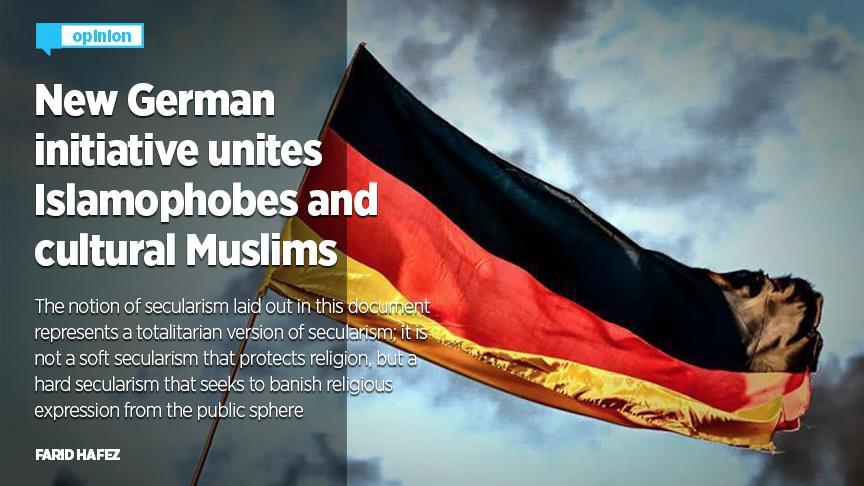
German flag overlaid with the text ‘New German Initiative unites Islamophobes and cultural Muslims: The notion of secularism laid out in this document represents a totalitarian version of secularism; it is not a soft secularism that protects religion, but a hard secularism that seeks to banish religious expression from the public sphere” and the name of the article author, Farid Hafez.
New German Initiative unites Islamophobes and cultural Muslims
This article by Bridge Initiative Senior Research Fellow Farid Hafez originally appeared on Anadolu Agency.
SALZBURG
Just at the height of electoral success of the most anti-racist (in terms of its program) Green party in Germany, former chairman Cem Özdemir made headlines with the founding of the “Initiative of secular Islam”. The weekly Der Spiegel ran a story on that, titled: “Prominent Islam experts founded the ‘Initiative of Secular Islam’ shortly before the start of the Fourth Islam Conference”. On closer inspection, however, it is noticeable that the understanding of secularity is rather shallow, and, to the contrary, a further politicization of religion can be observed. Another highly unsettling aspect is that people of questionable reputation rank among the patrons of this initiative.
Undoubtedly, the launching of this initiative was made to coincide with a significant political moment. Even if the founders are trying to give the impression that the initiative does not aim at competing with the existing Muslim associations, this is what exactly seems to be the case. In their declaration, the signatories argue that they want to create a council together with other conservative Muslim associations in order to become an important voice for Muslims vis-à-vis the state. But the claims in the declaration suggest that the initiative is not really interested in supporting the arguments of most Muslim organizations, but rather supports those of the dominant society. For example, the declaration supports the hijab ban for teachers, civil servants, and judges.
‘Enlightened Islam’
In its self-presentation, the initiative presents itself as a “league of secular Muslims from Germany, Austria and Switzerland”, which “desires an enlightened modern humanistic Islamic theology” and considers itself to be secular and liberal. The Freiburg Declaration is the common ground of the signatories. It presents the goals, visions and values, and the core ideas of the initiative. According to this declaration, the signatories “dream of a reform of Islam”. The first section makes clear what the declaration is all about: “faith as a private matter and religion as a matter between God and the individual”. In terms of values, the signatories invoke a “humanistic, modern and enlightened understanding of Islam”. This shows that the signatories still live in the age of secularity and have not yet stepped into the post-secular era, in which a religious discourse exists alongside a secular discourse and both are equally part of the public sphere. Moreover, the separation of religion and politics is pursued only to a limited extent. One demand, for example, states that a “humanistic-oriented Islamic religious education in all schools” should be introduced in public schools to promote integration and tolerance. Here, religion becomes very political.
The Freiburg Declaration becomes more specific when it comes to its goals. They want to assist female Imams like Seyran Ates, form a representative council of Muslims vis-à-vis the state, support concrete projects to empower girls and women, and in the fields of interreligious dialogue and the prevention of extremism. It seems obvious that by demanding all of these, they have already bought into the narrative of ‘violent extremist Islam’. Non-observant Muslims suddenly become interested in the governance of religion to basically support the claims of the dominant society, thereby weakening the position of those Muslims who have been delivering religious service for the last 60 years in Germany.
This becomes obvious when it comes to the already mentioned demand for a hijab ban: “We advocate that public servants, especially teachers and judges, refrain from wearing religion-based clothing, especially the headscarf”. These demands, which express a discriminatory attitude towards Muslim women wearing the hijab, are not novel ideas.
Read the full article here.

 Search
Search